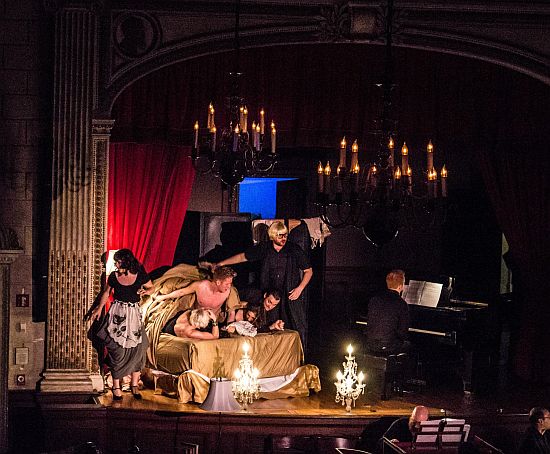 United States Jonathan Dawe, Così Faran Tutti, Orchestra of the Second Instrumental Unit, Ryan McAdams (conductor), Company XIV, Austin McCormick (Choreography), The Italian Academy for Advanced Studies in America, Columbia University, New York, 13.12.2012 (SSM)
United States Jonathan Dawe, Così Faran Tutti, Orchestra of the Second Instrumental Unit, Ryan McAdams (conductor), Company XIV, Austin McCormick (Choreography), The Italian Academy for Advanced Studies in America, Columbia University, New York, 13.12.2012 (SSM)
Cast:
Marcy Richardson: Fiordiligi
Ariana Chris: Dorabella
Mary Elizabeth Mackenzie: Despina
Glenn Seven Allen: Ferrando
Timothy McDevitt: Guglielmo
Chad Sloan: Don Alfonso
Dancers:
Laura Careless
Cailan Orn
Sean Gannon
Production:
Director: Alastair Boag
Lighting Design: Jeanette Oi-Suk Yew

Photo Credit: Joel Graham
Jonathan Dawe is one of our most talented and distinctive – yet little-known – contemporary composers. He will be looked back upon as one of the few librettists and composers of contemporary opera whose originality captivates and endears, whose music is both “modern” and deeply rooted in the past. Like Charles Ives’s scores, which at first seem gratuitously dissonant but ultimately resolve and reveal their grounding in traditional American music, so does Dawe’s music hearken back to Baroque and Classical opera. We’ve neither heard nor seen his operas – or have we?
Dawe’s genius is in his ability to deconstruct an earlier composer’s music, to fractalize it, breaking it down and then piecing it back together. This is no mere automatic process like randomizing notes. The result is music that, if not recognizable, seems familiar. In Così Faran Tutti, the overture’s fanfares, for example, echo Mozart. The continuo accompaniments to the recitatives (off-key in this case) mark the work as Mozart as well.
Calling itself a prequel to Mozart’s Così Fan Tutte, Così Faran Tutti plays on Mozart’s ambiguous title (translated variously as “So do they all,” or “All women are like that”).The small change in gender (“Tutte” to the masculine form “Tutti”) sums up the difference between these works. In Mozart’s opera the women are blamed for falling prey to their suitors’ deceptions: all women are like that. In Dawe’s version everyone is to blame. Everyone “does it.”
Opera frequently teeters on the edge of inanity. In Mozart’s Così, the two couples meet their disguised lovers and within seconds fall in love, minutes later fall out of love, get betrothed and get un-betrothed, and all within a single day. Alfonso exaggerates how the news of Ferrando and Guglielmo leaving for the army is the worst thing in existence, worse even than their deaths would be. At the end, the opera’s myriad complications seem to resolve themselves in an instant.
By comparison, Dawe’s characters almost always go completely over the brink. They sing long arias about the most minuscule and minor events. And it’s not just the two couples who fall in love with each other instantly: everyone falls in love with everyone else, men with women, women with women, men with men. This is what Norman O. Brown referred to as “polymorphous perversity,” not in the way Freud used this term to describe infants, but rather as the human ability to engage in any and all kinds of sexual activity.
Similarly, Dawe expands upon the clichéd ruse of having a masquerade party where the simple addition of a bandit’s mask over the eyes appears to completely disguise everyone. Taking this to a ridiculous level, Dawe has the women, whose body types could not be more different, come dressed as each other, clearly identifiable to anyone who’s not blind. The final, hysterically funny scene ends with all the characters in Despina’s bedroom (and with as many as can fit in her bed) impersonating each other. Despina, fearful of the return of Alfonso, tries to empty the room. Alfonso, previously depicted as a philosopher/scientist completely obsessed with his own ideas, barges in, singing in falsetto and wearing a wig to make him appear as Fiordiligi.
All the singers, dancers and instrumentalists were exceptional. Ryan Adams’s conducting was enthusiastic, spirited and committed to a score that is very complex. The dancers were lithe and suggestive, and the choreography by Austin McCormick was on a par with his delightful Baroque-style production earlier this year of Judge Me Paris.
The venue was the elegant theater of the Italian Academy with the seats arranged more sensibly than for the production of Dawe’s Cracked Orlando in 2010. The presence of a panel LCD screen, not always visible to all, gave subtitles to the Italian text.
What I said in my review of Cracked Orlando holds true here: “Mr. Dawe is to be congratulated for composing a rare, uncompromising work that needs no defense for its dissonance and atonality, is genuinely appealing in its own right, and puts to rest the complaints of those who still think the term ‘modern music’ is an oxymoron.”
Stan Metzger
Final performance tonight (December 15, 2012). For tickets: http://www.brownpapertickets.com/event/292772